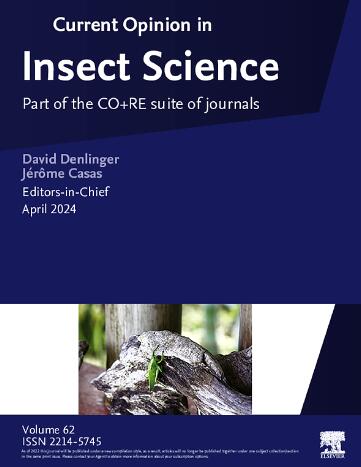Protecting honey bees through microbiome engineering
IF 4.8
1区 农林科学
Q1 BIOLOGY
引用次数: 0
Abstract
Honey bees are indispensable insects. Their pollination services support modern agriculture and natural ecosystems. Managed honey bee colonies face increasing threats to their survival, ranging from environmental stressors that include agrochemicals to infestations of arthropod pests and infections with microbial pathogens. Like humans, honey bees have a native gut microbiome that supports their health. However, the bee gut microbiome has a simpler composition than the gut microbiome of mammals, and its main constituent bacterial species can be easily cultured outside of the host. This experimental tractability and the need for new methods for protecting hive health have made honey bees a testbed for synthetic microbiomes augmented with probiotic bacteria and engineered DNA. Here, we discuss the natural benefits of bee gut bacteria, recent progress in genetically modifying these bacteria, and how symbiont-mediated RNA interference and other microbiome engineering approaches can boost bee immunity and suppress bee pathogens and parasites. Finally, we discuss how emerging methods for microbiome engineering and biocontainment could be applied to honey bees and used to address challenges in translating these proof-of-principle achievements into safe and effective technologies for field applications at scale.
利用微生物组工程保护蜜蜂。
蜜蜂是不可缺少的昆虫。它们的授粉服务支持现代农业和自然生态系统。管理的蜂群面临着越来越多的生存威胁,从包括农用化学品在内的环境压力因素到节肢动物害虫的侵扰和微生物病原体的感染。和人类一样,蜜蜂有天然的肠道微生物群来维持它们的健康。然而,蜜蜂肠道微生物群的组成比哺乳动物肠道微生物群更简单,其主要组成细菌种类可以很容易地在宿主体外培养。这种实验的可操作性和对保护蜂巢健康的新方法的需求使蜜蜂成为用益生菌和工程DNA增强的合成微生物组的试验台。在这里,我们讨论了蜜蜂肠道细菌的天然益处,基因改造这些细菌的最新进展,以及共生介导的RNA干扰和其他微生物组工程方法如何提高蜜蜂免疫力,抑制蜜蜂病原体和寄生虫。最后,我们讨论了微生物组工程和生物控制的新兴方法如何应用于蜜蜂,并用于解决将这些原理证明成果转化为大规模现场应用的安全有效技术的挑战。
本文章由计算机程序翻译,如有差异,请以英文原文为准。
求助全文
约1分钟内获得全文
求助全文
来源期刊

Current opinion in insect science
BIOLOGYECOLOGYENTOMOLOGY-ECOLOGY
CiteScore
10.40
自引率
1.90%
发文量
113
期刊介绍:
Current Opinion in Insect Science is a new systematic review journal that aims to provide specialists with a unique and educational platform to keep up–to–date with the expanding volume of information published in the field of Insect Science. As this is such a broad discipline, we have determined themed sections each of which is reviewed once a year.
The following 11 areas are covered by Current Opinion in Insect Science.
-Ecology
-Insect genomics
-Global Change Biology
-Molecular Physiology (Including Immunity)
-Pests and Resistance
-Parasites, Parasitoids and Biological Control
-Behavioural Ecology
-Development and Regulation
-Social Insects
-Neuroscience
-Vectors and Medical and Veterinary Entomology
There is also a section that changes every year to reflect hot topics in the field.
Section Editors, who are major authorities in their area, are appointed by the Editors of the journal. They divide their section into a number of topics, ensuring that the field is comprehensively covered and that all issues of current importance are emphasized. Section Editors commission articles from leading scientists on each topic that they have selected and the commissioned authors write short review articles in which they present recent developments in their subject, emphasizing the aspects that, in their opinion, are most important. In addition, they provide short annotations to the papers that they consider to be most interesting from all those published in their topic over the previous year.
 求助内容:
求助内容: 应助结果提醒方式:
应助结果提醒方式:


